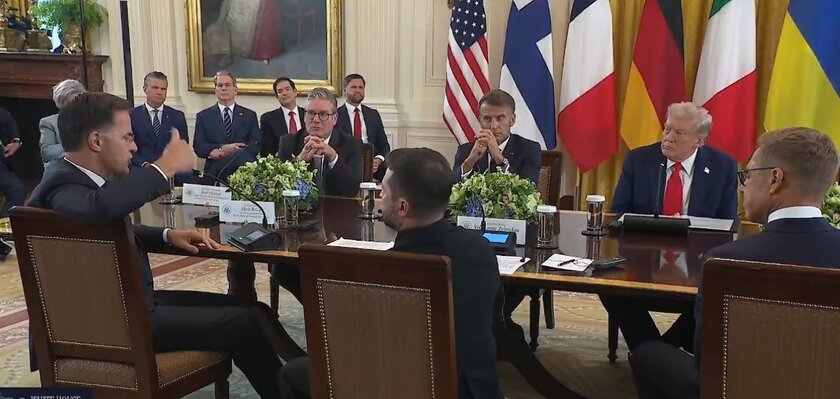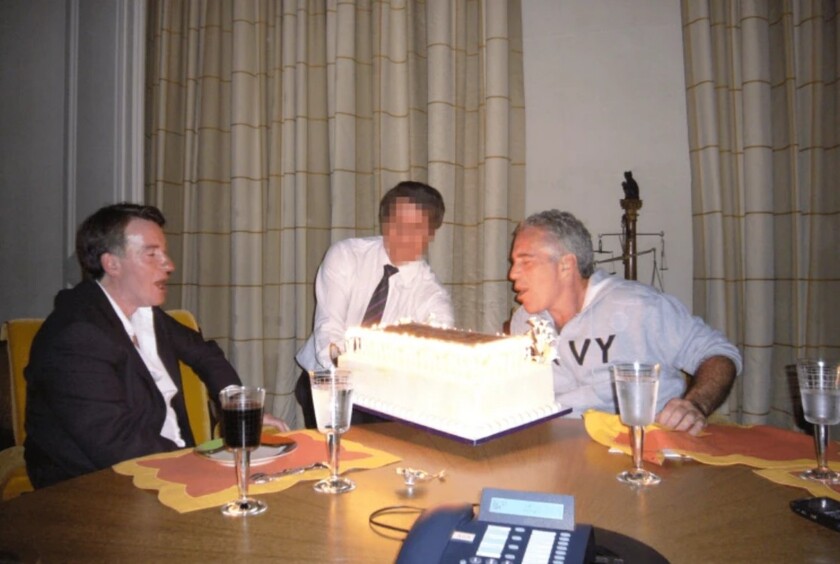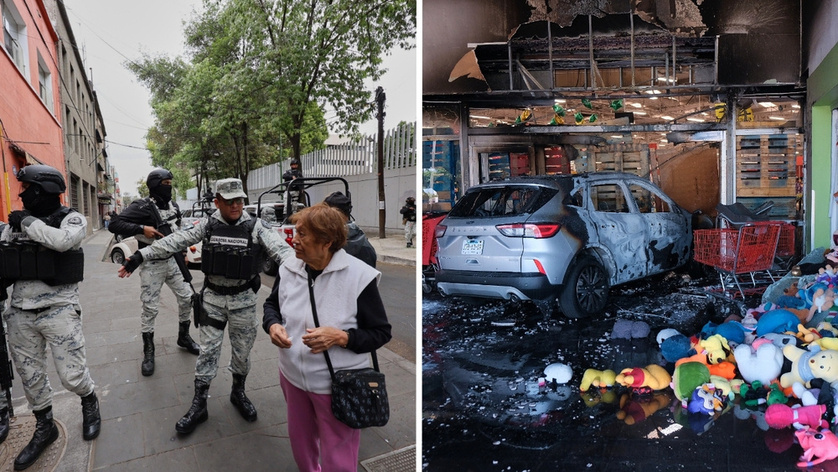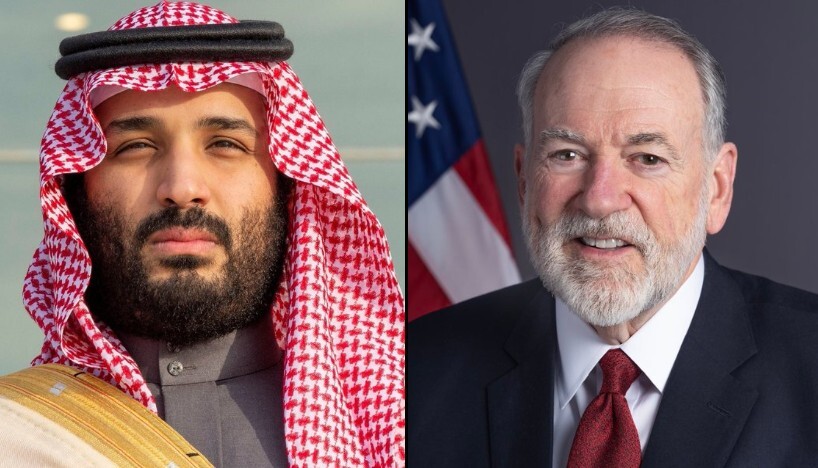President Donald Trump held a high-stakes meeting at the White House on Monday, with Ukrainian President Volodymyr Zelensky and a delegation of European leaders, including German Chancellor Friedrich Merz, French President Emmanuel Macron, Italian Prime Minister Giorgia Meloni, Finnish President Alexander Stubb, and UK Prime Minister Keir Starmer, to discuss a potential end to the war in Ukraine.
The meeting, which included a private session with Zelensky and a subsequent multilateral discussion, focused on security guarantees for Ukraine, a possible exchange of territory, and the arrangement of direct talks between Zelensky and Russian President Vladimir Putin, followed by a trilateral meeting including Trump.
Trump announced in a Truth Social post that he had called Putin during the meeting to begin arranging the bilateral encounter, stating that Putin had agreed to accept security guarantees for Ukraine, a development he described as a "very significant step." Zelensky confirmed the discussion of security guarantees and stated they would be formalized on paper within the next week to ten days.
The core of the discussions centered on security guarantees for Ukraine, which Trump stated would be provided by various European countries with coordination from the United States. Zelenskyy emphasized the need for guarantees involving weapons, training missions, and intelligence, and confirmed that details would be worked out within 10 days.
European leaders, including Stubb, expressed cautious optimism but noted there was "nothing concrete" yet about U.S. participation in the guarantees. The Kremlin has previously rejected the deployment of NATO troops in Ukraine as part of any security package.
The discussions at the White House Monday, were marked by a public show of unity, but behind the scenes, there were significant disagreements, particularly on the necessity of a ceasefire before further talks. The U.S. also reportedly discussed a potential $90 billion weapons purchase by Ukraine as part of the security guarantees.
Speaking to reporters before the start of the meeting, Merz broke with the generally optimistic tone of European leaders, stating that peace talks could not continue without a ceasefire.
Merz, who has been in office since May, issued an impassioned call for an immediate ceasefire in Ukraine, despite Trump having repeatedly expressed his belief that a ceasefire is not necessary to achieve a permanent peace between Russia and Ukraine.
The German leader thanked the president for arranging the meeting at the White House, calling it "extremely helpful." However, he said that "the next steps ahead are the more complicated ones."
"Now the path is open. You opened it last Friday, but now the way is open for complicated negotiations," he said, adding, "And to be honest, we all would like to see a ceasefire at the latest from the next meeting on."
"I can't imagine that the next meeting would take place without a ceasefire," he went on. "So, let's work on that."
He urged leaders to pressure Russia to agree to a ceasefire, saying, "Let's try to put pressure on Russia, because the credibility of this effort, these efforts we are undertaking today are depending on, at least, a ceasefire from the beginning of the serious negotiations from the next step on. So, I would like to emphasize this aspect and would like to see a ceasefire from the next meeting, which should be a trilateral meeting wherever it takes place."
In response, Trump, who has said he is determined "to go directly to a peace agreement" without a ceasefire, said, "Well, we're going to let the president [Zelenskyy] go over and talk to the president [Putin], and we'll see how that works out."
Trump pointed to his recent successes in helping to broker peace deals between other countries without a ceasefire.
"I will say, and again, I say it, in the six wars that I've settled, I haven't had a ceasefire," he said. "We just got into negotiations and… one of the wars was, as you know, in the Congo, was 30 years, 31 years long. Another one that we settled last week was two great countries, was 35 years going on, and we had no ceasefire."
"So, if we can do the ceasefire, great. And, if we don't do the ceasefire because many other points were given to us, many, many points were given to us. Great points," he added.
Trump in the Truth Social post confirmed he had initiated arrangements for a direct meeting between Zelensky and Putin, which would be followed by a trilateral summit including himself. Zelenskyy stated he was ready to meet Putin and invited Trump to participate in future peace discussions.
After the meeting, Trump wrote "I had a very good meeting with distinguished guests, President Volodymyr Zelenskyy, of Ukraine, President Emmanuel Macron, of France, President Alexander Stubb, of Finland, Prime Minister Giorgia Meloni, of Italy, Prime Minister Keir Starmer, of the United Kingdom, Chancellor of the Federal Republic of Germany, Friedrich Merz, President of the European Commission, Ursula von der Leyen, and Secretary General of NATO, Mark Rutte, in the White House, which ended in a further meeting in the Oval Office.
"During the meeting we discussed Security Guarantees for Ukraine, which Guarantees would be provided by the various European Countries, with a coordination with the United States of America. Everyone is very happy about the possibility of PEACE for Russia/Ukraine. At the conclusion of the meetings, I called President Putin, and began the arrangements for a meeting, at a location to be determined, between President Putin and President Zelenskyy.
"After that meeting takes place, we will have a Trilat, which would be the two Presidents, plus myself. Again, this was a very good, early step for a War that has been going on for almost four years. Vice President JD Vance, Secretary of State Marco Rubio, and Special Envoy Steve Witkoff, are coordinating with Russia and Ukraine. Thank you for your attention to this matter!"
While Trump expressed strong confidence in the process, European leaders like Macron and Stubb were more skeptical, with Stubb stating Putin "cannot be trusted" and the EU leaders emphasizing the need for a ceasefire before further negotiations. The U.S. has not ruled out the possibility of American troops helping to guarantee peace if an agreement is reached.
The meeting followed a summit between Trump and Putin in Alaska, where Trump claimed Putin agreed to accept security guarantees for Ukraine. This White House gathering was a follow-up effort to build on that initial discussion and bring European allies on board.
The European leaders traveled to Washington in solidarity with Ukraine, aiming to ensure the peace process safeguarded Ukrainian sovereignty and territorial integrity.















